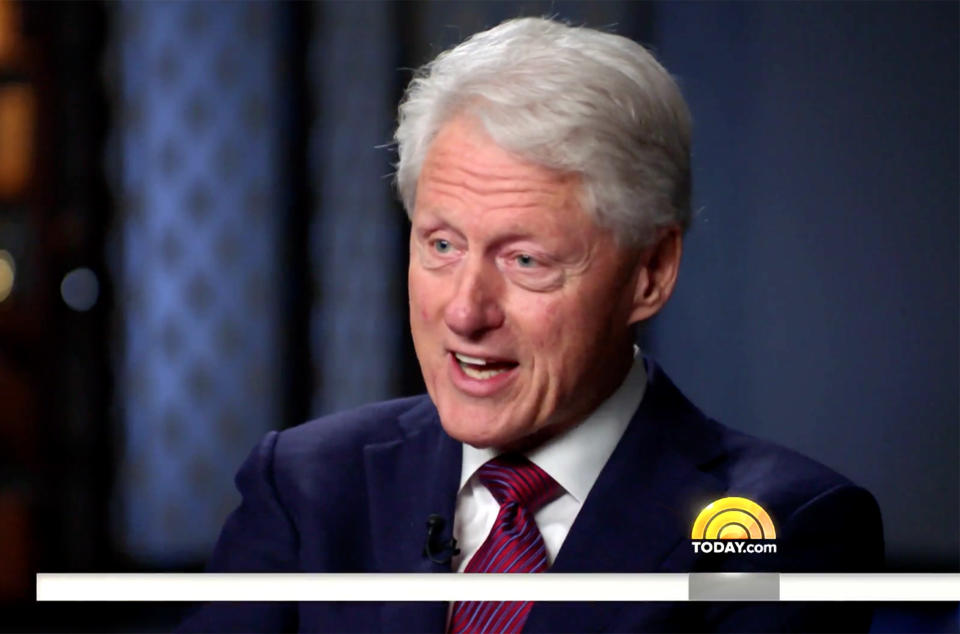The Clinton-Lewinsky scandal is now part of the #MeToo movement. Here's why

Former President Bill Clinton appeared on the Today Show Monday morning, where he was asked about his affair with Monica Lewinsky in light of #MeToo.
Interviewer Craig Melvin linked the 23-year-old Clinton-Lewinsky scandal (for those who may not recall, then-49-year-old President Clinton carried on a sexual affair in the Oval Office with Lewinsky, a 22-year-old White House intern, and was ultimately impeached for his behavior and then acquitted) to the current social movement. He asked Clinton, “Looking back on what happened then, through the lens of #MeToo now, do you think differently? Or feel more responsibility?” Melvin also quoted a recent essay by Lewinsky that questioned her ability back then to truly have consent and asking,

However many on Twitter didn’t see the same connection as Melvin, and therefore found that there’s no need for Clinton to apologize to Lewinsky, as they were both consenting adults.
IDGAF about Bill Clinton’s Consensual, NON #metoo bl*w job 23 years ago.
— ℰ (@pinklionheart) June 4, 2018
Monica Lewinsky is not a #MeToo victim. She was caught someone walked in on her. No amount of #MeeToo comparison can change that! She was enamored w/ Bill Clinton & cared nothing about his wife & child in that WH. TV coverage captured Her face & body language when in his presence https://t.co/KWRRzkUaoO
— Glogi’s_take (@MyTake48) June 4, 2018
I could care less about the Lewinsky sex. She was a grown woman who continually got on her knees. so be it. I want to know more about the facts of Orgy Island & other women accusing #BillClinton of sexual harrassment thats non-consentual #metoo https://t.co/IkZbQEbSUQ
— Dr Shalomim HaLahawi (@DrShalomim) June 4, 2018
However experts in sexual consent, relationship psychology, and workplace ethics say that the connection between the scandal and today’s movement, which is focused on pushing back against all sorts of sexual abuses of power in the workplace, could not be stronger or clearer.
“It has everything to do with ‘Me too’,” Jaclyn Friedman, author of books on sex and power including Unscrewed: Women, Sex, Power and How to Stop Letting the System Screw Us All, tells Yahoo Lifestyle. “He’s the leader of the free world and she’s 22. He’s the ultimate boss. It’s a pretty straightforward abuse of power.” As far as people noting that Lewinsky was a “consenting adult,” Friedman adds, “She had no real ability to say ‘yes’ or ‘no’ to the President of the United States. There are many situations where truly given sexual consent is not possible — and your boss being president of the United States is one of them… It doesn’t seem that complicated to me.”
Many human resources departments even have policies forbidding relationships between bosses and subordinates because of how clearly problematic they can be — something Chris Edmonds, who works with senior executives on workplace culture through his consulting company the Purposeful Culture Group, can completely understand.

“It gets down to the unfairness of someone with positional authority — a boss, a president… So while it might fee like it’s mutual, and like it’s fair, the reality is you can’t ignore the positional authority, the power authority,” he tells Yahoo Lifestyle. “So the idea that many HR policies have is that ‘nothing good can come of this.’ There are always going to be players who leverage that authority for their own gain, and I don’t blame HR leaders for putting the kibosh on it.”
Edmonds adds, “The idea that there wasn’t a power differentiation in the Bill and Monica situation is ludicrous. It could not have been bigger. This was not a neutral ground for that relationship to start.”
Psychologist Judy Ho, Pepperdine University professor and co-host of CBS’s Face the Truth, adds that HR departments are not the only ones who recognize the inherent problems in these dynamics. “Many licensing boards have ethical code that apply to this, because they recognize that an aspect of coercion is almost always at play in these types of relationships — for example, between doctors and patients, or professors and students,” she tells Yahoo Lifestyle, stressing that she neither excuses Lewinsky for her role in the affair nor unilaterally blames Clinton.
“When subordinates are propositioned by their supervisors… they have much more to lose than the person in power,” she adds. “They can possibly lose their jobs if things go south, and they are more vulnerable to having concrete and swift consequences — such as being shunned from work opportunities for advancement, being socially isolated at work, or even being terminated.”
So before critics of Melvin’s dismiss the #MeToo connections, it’s important to understand that the question of consent gets murky when there is a power imbalance — making the question of whether the players were both legal adults pretty much irrelevant.
“Issues of power and consent are much clearer when it comes to outliers and criminal actions — such as sex between an adult and a child, or between a personality-disordered predator (such as Harvey Weinstein) and an actress, or between a rapist and a victim,” Beverly Hills-based psychoanalyst and marriage therapist Bethany Marshall tells Yahoo Lifestyle. “When a very powerful person approaches a much less powerful person for sex, the issue tends to become less clear. But we should be clear as a society that the use of power to coerce sex is at the heart of both the #MeToo movement and all sexually predatory behavior.”
Marshall adds that, as a society, we are now in the midst of re-evaluating issues of consent, power, and sexuality. “As a result of that, we are now realizing that the Left may have given President Clinton a pass,” she says. “And that the power discrepancy between Clinton and Lewinsky may have interfered with her ability to give consent.”
Friedman also points out the conflict that’s likely being felt by Clinton’s many longtime cheerleaders, who are now finally seeing his behavior in a different light. “People on the Left are having a hard time with it, because they don’t want to admit he is flawed — and because it means admitting that we were wrong,” she says. “So many of us defended him, saying he was targeted… by Ken Starr. But he was targeted and he did do something wrong, and both of those things can be true. Nothing gets better if we don’t confront those difficult truths.”
Read more from Yahoo Lifestyle:
Monica Lewinsky on How the #MeToo Movement Has Redefined the Clinton Scandal
That ‘Creepy’ Time Monica Lewinsky Finally Met Clinton Prosecutor Ken Starr
Follow us on Instagram, Facebook, and Twitter for nonstop inspiration delivered fresh to your feed, every day.


